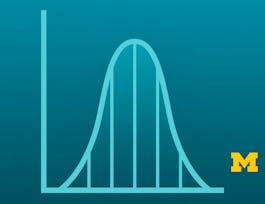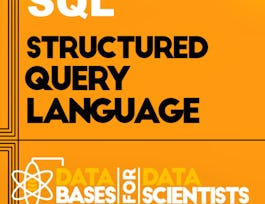Data is everywhere. Charts, graphs, and other types of information visualizations help people to make sense of this data. This course explores the design, development, and evaluation of such information visualizations. By combining aspects of design, computer graphics, HCI, and data science, you will gain hands-on experience with creating visualizations, using exploratory tools, and architecting data narratives. Topics include user-centered design, web-based visualization, data cognition and perception, and design evaluation.



Fundamentals of Data Visualization
This course is part of Vital Skills for Data Science Specialization

Instructor: Danielle Szafir
Sponsored by IEM UEM Group
7,005 already enrolled
(32 reviews)
Recommended experience
What you'll learn
Develop a toolkit for exploring and communicating complex data using visualization
Produce basic data visualizations using a chosen dataset
Compare methods for visualizing data and understand how these methods may guide users towards different conclusions
Evaluate how effectively a visualization conveys target data
Skills you'll gain
Details to know

Add to your LinkedIn profile
3 assignments
See how employees at top companies are mastering in-demand skills

Build your subject-matter expertise
- Learn new concepts from industry experts
- Gain a foundational understanding of a subject or tool
- Develop job-relevant skills with hands-on projects
- Earn a shareable career certificate


Earn a career certificate
Add this credential to your LinkedIn profile, resume, or CV
Share it on social media and in your performance review

There are 3 modules in this course
In this module, you will learn the foundations of visualization design. You will walk through the key components of a visualization, how we effectively represent data using channels like color, size, and position, and some ground rules for honest and effective visualization. You will also gain preliminary exposure to Altair, a Python library for rapidly generating interactive visualizations. Each week will also include either two readings or one reading and one notebook activity.
What's included
13 videos14 readings1 assignment2 discussion prompts2 ungraded labs
In this module, you will learn how to choose the right visualization for a given scenario. You will learn how to reason about the different kinds of questions people ask with visualization and, how to align your design with that task. The module will cover basics of task analysis, methods for task elicitation, and foundational knowledge of visual perception for design. Each week will also include two external readings or one reading and one notebook activity.
What's included
9 videos7 readings1 assignment1 discussion prompt
In this module, you will learn how to assess the effectiveness of your visualization. You will learn both qualitative and quantitative approaches for evaluating visualizations as well as how to isolate key elements for assessment and iteration. The module will cover basics of insight-based evaluation, interview studies, and experimental design and analysis. Each week will also include two external readings or one reading and one notebook activity.
What's included
7 videos7 readings1 assignment1 discussion prompt
Instructor

Offered by
Why people choose Coursera for their career




Learner reviews
32 reviews
- 5 stars
81.25%
- 4 stars
12.50%
- 3 stars
6.25%
- 2 stars
0%
- 1 star
0%
Showing 3 of 32
Reviewed on Dec 16, 2023
Very Lively interaction from the mentor. Simplified explanations
Recommended if you're interested in Data Science

University of Michigan

University of Colorado Boulder

Coursera Instructor Network

Open new doors with Coursera Plus
Unlimited access to 10,000+ world-class courses, hands-on projects, and job-ready certificate programs - all included in your subscription
Advance your career with an online degree
Earn a degree from world-class universities - 100% online
Join over 3,400 global companies that choose Coursera for Business
Upskill your employees to excel in the digital economy



